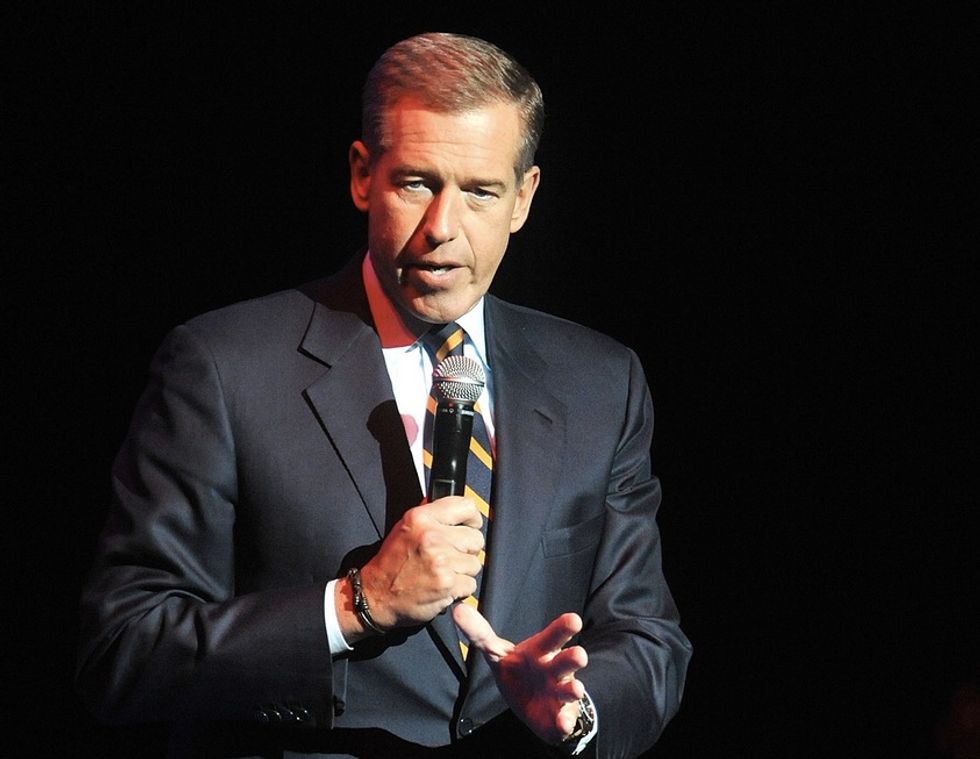
Brian Williams (Image source: Brad Barket/Invision/AP, File)

By now, most, if not all, Americans have heard about the embarrassing situation that NBC News anchor, Brian Williams, recently found himself in.
Williams issued an apology to troops after he claimed that he was in a helicopter that was forced down by rocket-propelled grenade fire in 2003. Following his apology, Williams essentially gave himself a temporary leave of absence from his anchor desk.
Other questions have now arisen as to the legitimacy of Williams’ statements made during his reporting on Hurricane Katrina from New Orleans in 2005 and Israel’s war with the militant group Hezbollah in 2006.
Whether new allegations will surface or if the entire matter will just fade away eventually, remains to be seen.

What I’ve been struggling with while watching the news unfold on Williams’ debacle is the question of where do Americans stand on the issue of truth and does it still matter to them?
Most of us remember as a child being taught by our parents, teachers and other relatives about the importance of telling the truth.
We were given the example and taught the story of our nation’s first United States president, George Washington, who supposedly chopped down his father’s cherry tree when he was just a young child.
As the story goes, when asked by his father who cut down the tree, Washington admitted to destroying the tree by responding, “I cannot tell a lie.”
As a result of telling the truth, Washington was not punished by his father because his father felt Washington’s honesty was worth more than a 1,000 trees.
Some question the credibility of the story because the only source was a neighbor of Washington’s who recounted the tale some 10 years after Washington’s death.
Regardless, if untrue, Washington did not fabricate it. The purpose of the story, however, was to illustrate the importance of integrity.
The significance of telling the truth obviously meant a great deal to those during Washington’s lifetime and to future generations who have been taught the legendary tale.
Then there are quotes by our 16th U.S. president, Abraham Lincoln, who had a few noteworthy opinions of his own to make about being truthful.
Lincoln said, “I am a firm believer in the people. If given the truth, they can be depended upon to meet any national crisis. The great point is to bring them the real facts.”
He also said, “You can fool some of the people all of the time, and all of the people some of the time, but you cannot fool all the people all the time.”
As with Washington’s quotes, Lincoln’s quotes have also been passed on generationally so that we will never forget the relevance of truth to our individual and shared lives as Americans.
While you may not have seen people quoting Washington's or Lincoln's truthful character as the type of trustworthiness that is expected from the mainstream media following Williams’ admission that he lied, what you did see was a public who voiced their disappointment regarding his lack of integrity by taking to social media. Many posted photoshopped photos of Williams in places or in situations that he clearly was never involved in.

Why? Because the American public knows that truth still matters.
Being truthful matters even more when a person is placed in a position of apparent authority, like Williams who is in a position responsible for delivering honest and factual news to the American public.
Many will argue that the mainstream media hasn’t been truthful for years and that people shouldn’t trust them anyway.
While this may be a reflection of the frustrations felt by many about the mainstream media, it does not excuse the behavior of the person entrusted by the public to deliver the truth.
The position that Williams holds has traditionally has been one in which an implied “bond of trust” exists between the American public and the lead anchor.
Walter Leland Cronkite, Jr., CBS Evening News anchorman for 19 years, was a highly respected and trusted broadcaster who epitomized someone in whom the public could feel confidence in. Americans believed he would tell it to them straight.
Cronkite became known as the news man who was the voice of truth for America and “the most trusted man in America.”
Perhaps with Williams’ latest indiscretion, Americans will resign themselves to the fact, if they haven’t already, that the mainstream media will never again hold the trusted position it once held when Cronkite was at the helm.
–
TheBlaze contributor channel supports an open discourse on a range of views. The opinions expressed in this channel are solely those of each individual author.